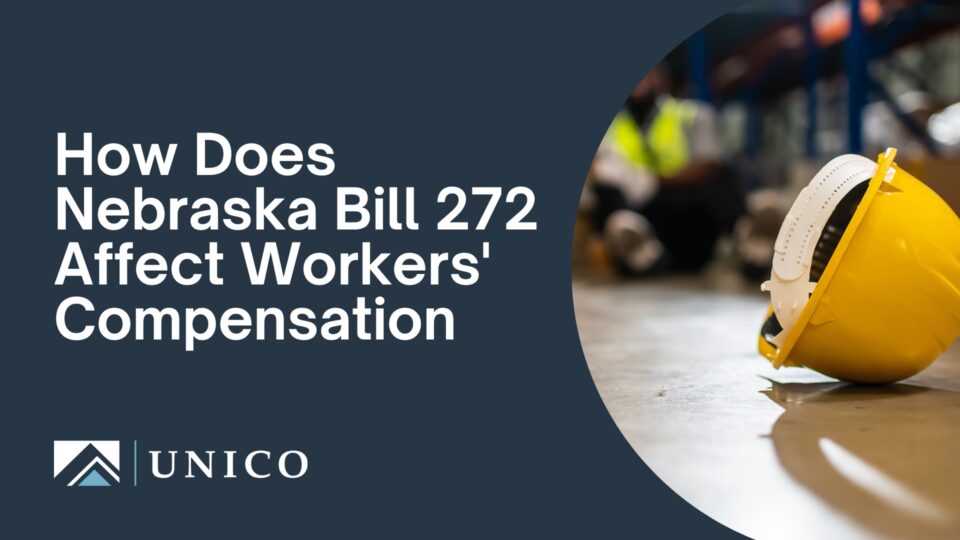LB 272: Change provisions relating to the date when compensation begins under the Nebraska Workers’ Compensation Act
Tom Champoux, President and Risk Consultant, provided testimony in opposition to LB 272 on behalf of Nebraskans for Workers’ Compensation Equity and Fairness and the Nebraska State Chamber of Commerce and Industry.
Read Tom’s official testimony in opposition of LB 272 below.

Senator Vargas and the Business and Labor Committee,
Thank you for your time in considering testimony on LB 272. I am a Property and Casualty insurance broker from Lincoln, Nebraska and Workers Compensation is one area of focus for me. I am opposed to LB 272 in its current form, as it will undoubtedly increase Workers Compensation costs for Nebraska employers. This bill, should it be come law, would also likely have a negative impact on the effectiveness of employer “Return to Work” or “Light Duty” programs that ease injured employees back into the workforce and also allows employers to minimize the impact of their future Workers Compensation costs.
Workers Compensation insurance is “experience rated”, for premium development. This simply means that the employer pays future premiums based on a three-year claims “lookback period”. The National Council of Compensation Insurance or “NCCI” performs these individual employer calculations for Nebraska and many other states, after receiving loss information from the insurance companies. Each employer is then provided with an annual “Experience Modifier Calculation,” which significantly impacts what their Workers Compensation premium will be for that policy year.
Nebraska is also an “Experience Rating Adjustment” state, which means that all Workers Compensation claims that an employer is able to keep “Medical Only” and which include no “Indemnity” payments (which include lost wages) are reduced by 70% as they impact said Experience Modifier Calculation. This fact creates a terrific opportunity for employers to be financially rewarded for getting injured employees back to work quickly, and follow any work-related restrictions, directed by the employee’s treating physician. Reducing the waiting period for lost wages to be paid from 7 to 3 days will mean that many more Workers Compensation claims in Nebraska will include indemnity payments, which are calculated at 100% in the Experience Modifier Calculation, instead of 30%. You see, once $1.00 of “indemnity”, which again includes lost wages, has been paid, the claim no longer enjoys “Medical Only” status.
Reducing the waiting period from 7 days to 3 days will increase employer’s workers’ compensation costs. A longer window affords an employee time to seek appropriate care from their primary care physician or agreed upon healthcare facility.
It concerns me that this change will not only drive up Workers Compensation costs for Nebraska employers, but will also have a detrimental impact on the incentive for employers to create and maintain vibrant Return to Work programs. We have many Nebraska employers who are doing very good things with their Return to Work programs, to the benefit of everyone involved.
If this bill were to become law, premiums for employers will undoubtedly increase shortly after enactment. Premiums will increase for virtually all employers in anticipation of the additional indemnity payments that will follow. The increase in cost of Workers Compensation insurance and the financial impact it has on our employers, may well have a negative impact on providing overall compensation and benefits to all employees, though it is clear that this is not this bill’s intent. Employer money spent on Workers Compensation insurance is money that cannot be spent on things that benefit all working people in Nebraska.
Return to work or light duty programs will also be severely impacted. 3 days may not give employers sufficient time to set up modified work accommodations to meet the needs of the injured person.
Reducing the “retroactive” benefits waiting period from 42 days to 14 days will also likely cause an increase in Workers Compensation premiums for Nebraska employers. However, this change will likely not be as financially damaging as the reduction from 7 days to 3 for lost wages to begin to be paid. The ability for an employer to effectively keep as many of the Workers Compensation claims they have as “Medical Only” is substantial. This allows them to control their future costs better, while having great incentive to get injured workers treated quickly and back to work in some capacity. With many claims, it takes a few days to have the injured worker seen by a physician and then also to hear from the medical provider on any work restrictions. This will result in many more Workers Compensation claims in Nebraska being settled with indemnity payments and increased premiums for our employers.

Tom Champoux, CPCU, AIC, CWCA
President, Risk Consultant
Tom Champoux has over 25 years of risk management and consulting experience. He frequently speaks to audiences on an ongoing basis and is an expert on the experience mod formula and strives to assist clients by improving their Workers’ Compensation results.




